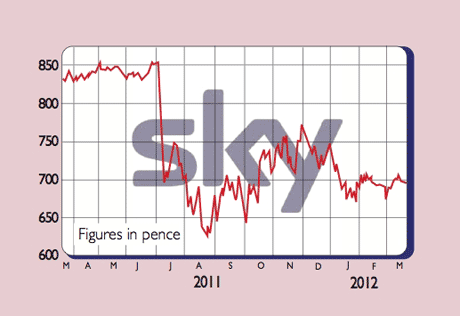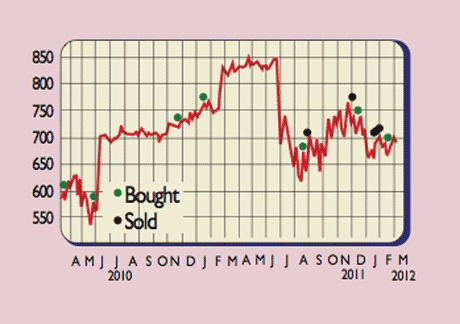Shares in focus: Who would bet against Sky?
Anyone who has bet against British satellite broadcaster Sky has missed a trick, says Phil Oakley. But should you still buy its shares?
Get the latest financial news, insights and expert analysis from our award-winning MoneyWeek team, to help you understand what really matters when it comes to your finances.
You are now subscribed
Your newsletter sign-up was successful
Want to add more newsletters?

Twice daily
MoneyWeek
Get the latest financial news, insights and expert analysis from our award-winning MoneyWeek team, to help you understand what really matters when it comes to your finances.

Four times a week
Look After My Bills
Sign up to our free money-saving newsletter, filled with the latest news and expert advice to help you find the best tips and deals for managing your bills. Start saving today!
Anyone who hasbet against Skyin the past has missed a trick, says Phil Oakley, but should you still buy in?
The business
Sky is Britain's largest satellite TV broadcaster with 10.5 million customers. It offers a number of TV subscription packages with a wide variety of channels covering entertainment, news, sport and films. It is increasingly providing content over the internet with its Sky Go service. Sky also provides broadband and home telephone services.
The history
Rupert Murdoch formed Sky in 1989 as a satellite TV service offering four channels. The following year, Sky merged with rival British Satellite Broadcasting to form BSkyB. The early years were tough, with the company on the verge of bankruptcy.
MoneyWeek
Subscribe to MoneyWeek today and get your first six magazine issues absolutely FREE

Sign up to Money Morning
Don't miss the latest investment and personal finances news, market analysis, plus money-saving tips with our free twice-daily newsletter
Don't miss the latest investment and personal finances news, market analysis, plus money-saving tips with our free twice-daily newsletter
In 1992, its fortunes were transformed after it paid £304m for an exclusive three-year deal to screen live coverage of English Premier League football. In 1998, Sky Digital became Britain's first digital TV service, but profits initially suffered as it had to give away free set-top boxes to encourage people to take the service. It soon became a great hit with UK consumers due to its offer of exclusive sports, films and popular US programmes.
However, in recent years its dominant position has been challenged. Competition authorities have attempted to cut Sky's stranglehold on domestic football rights by allowing new entrants into the market. British regulator Ofcom also capped the amount it could charge competitors to carry Sky Sports on their broadcasting platforms.
BSkyB has been aggressive in countering competition. In 2006 it spent nearly £1bn buying 18% of ITV in order to stop Richard Branson's Virgin Media buying the company. The plan worked, but BSkyB was later forced to sell most of its stake at a loss.
The Sky juggernaught has rolled on, leading its markets with innovative products, such as its Sky + personal video recorder, Sky Mobile and high-definition (HD) services. In 2011, an £8bn takeover bid by Rupert Murdoch's News Corporation for the outstanding 61% of the company's shares was withdrawn after a phone hacking scandal at the group's British newspapers.
The chief executive
Given that News Corporation owns 39.1% of the company, it seems fair to ask who actually runs BSkyB? Jeremy Darroch has been chief executive since 2007. Coming from modest beginnings in Newcastle, he started out as an accountant before going to work for Procter & Gamble for 12 years.
After being finance director at Dixons he assumed the same position at BSkyB in 2004. By all accounts, Mr Darroch is a likeable man who has done a very good job of running Sky. He was paid £2.8m in 2011.
Should you buy the shares?
Sky is a company that divides public and investor opinion. It has been the subject of a number of doom-laden prophecies over the years, but continues to thrive. It is holding on to its customers and selling them more products. Plus it generates more and more surplus cash flow. Only 29% of its customers take a bundle of TV, broadband and phone services, so it has scope for future growth.
However, whether Sky can persuade the 13 million homes in Britain that have pay TV to take its services is another matter. Plenty are content with Freeview and don't want to pay any more. Smart devices (TVs and phones) are increasing choice for consumers and Sky is having to innovate and freeze prices in order to defend its position.
Then there is the question mark over content. How would Sky fare if it was to lose the broadcasting rights for premier league football, for example? With News Corp's large shareholding, the chances of another takeover bid looks remote.
It has been unwise to write off Sky in the past, but a weak economy and rising competition means its shares are a hold' at best.
The numbers

Stockmarket code: BSY
Share price: 691p
Market cap: £11.8bn
Net assets (Dec 2011): £1.1bn
Net debt (Dec 2011): £615m
P/e (current year estimate): 14.2 times
Yield (prospective): 3.6%
What the analysts say
Buy: 12
Hold: 12
Sell: 4
Average price target: 750p
Director Shareholding

J Darroch: 296,157
A Griffith: 87,533
N Ferguson: 12,917
Get the latest financial news, insights and expert analysis from our award-winning MoneyWeek team, to help you understand what really matters when it comes to your finances.
Phil spent 13 years as an investment analyst for both stockbroking and fund management companies.
-
 How should a good Catholic invest? Like the Vatican’s new stock index, it seems
How should a good Catholic invest? Like the Vatican’s new stock index, it seemsThe Vatican Bank has launched its first-ever stock index, championing companies that align with “Catholic principles”. But how well would it perform?
-
 The most single-friendly areas to buy a property
The most single-friendly areas to buy a propertyThere can be a single premium when it comes to getting on the property ladder but Zoopla has identified parts of the UK that remain affordable if you aren’t coupled-up